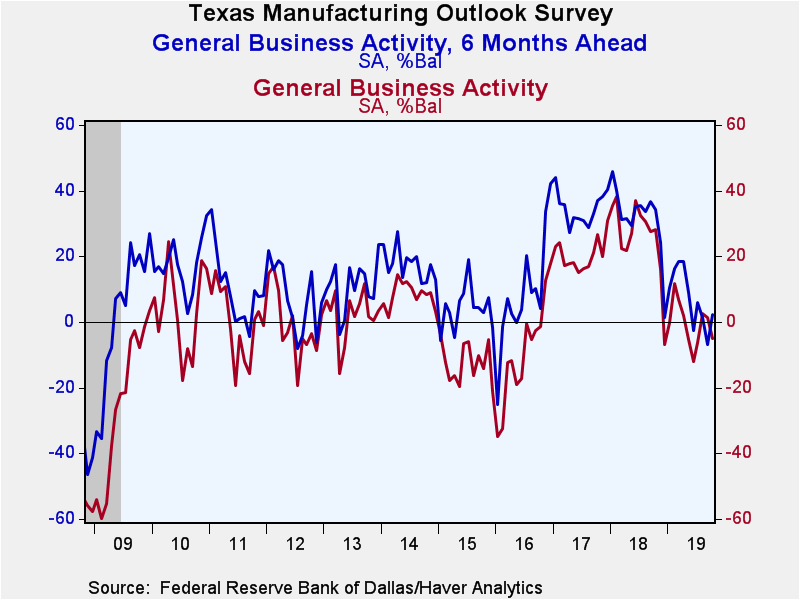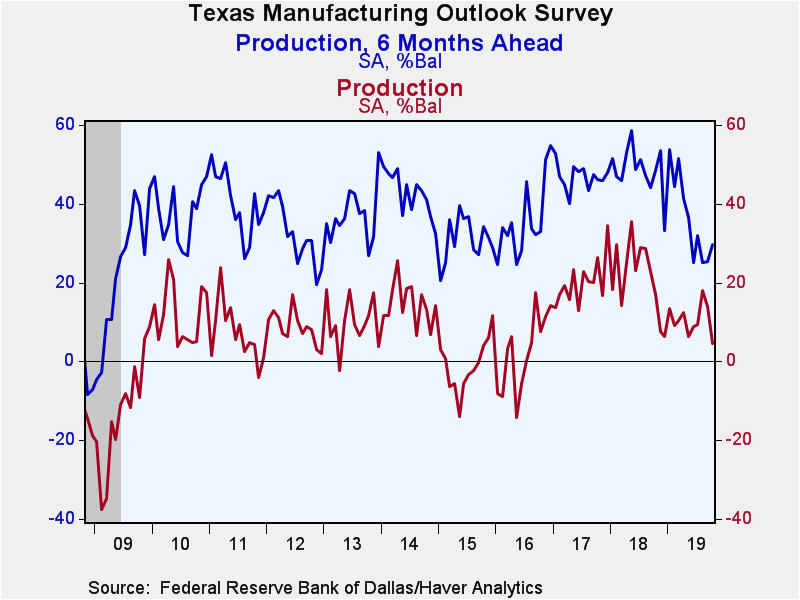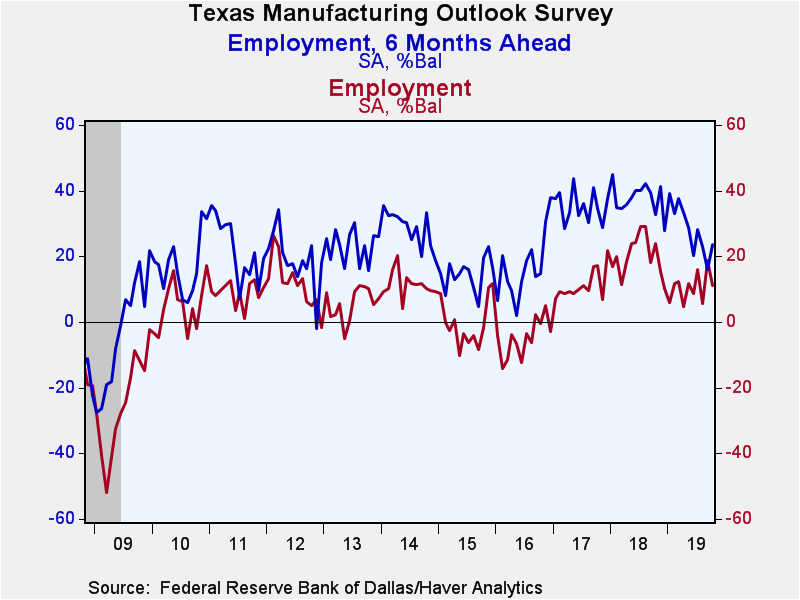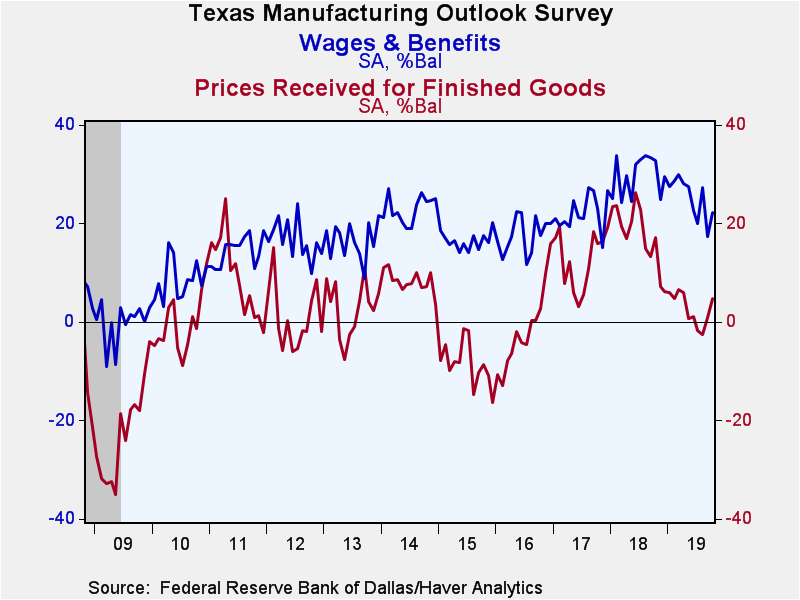 Global| Oct 28 2019
Global| Oct 28 2019Texas Factory Sector Activity Weakens; Prices Improve
by:Tom Moeller
|in:Economy in Brief
Summary
The Federal Reserve Bank of Dallas reported in its Texas Manufacturing Outlook Survey that the General Business Activity Index declined to -5.1 during October after falling to 1.5 in September. It remained down sharply from the [...]
The Federal Reserve Bank of Dallas reported in its Texas Manufacturing Outlook Survey that the General Business Activity Index declined to -5.1 during October after falling to 1.5 in September. It remained down sharply from the February 2018 high of 38.2. During the last ten years, there has been a 67% correlation between the index level and the q/q change in year GDP. Improving sharply, however, was the company outlook measure as it rose to the highest level since February.
A weakened orders growth rate index accompanied the decline in the Business Activity measure as it fell to -5.9, nearly the lowest level in three years. Production dropped sharply to 4.5 from its May '18 high of 35.4. The employment index also weakened as did shipments, unfilled orders (significantly) and hours-worked. An improved wages & benefits reading countered these declines with a modest rise that recovered half a sharp September weakening. The level of 22.2 compared to a high of 33.8 in August of last year.
Price measures improved. The finished goods prices received index rose to 4.8, its highest level in six months but still below the June 2018 high of 26.2. The prices paid index for raw materials also rose to 22.8, but remained below the high of 54.3 in June 2018.
The index of expected business conditions in six months does not suggest much improvement ahead. Its slight increase to 2.4 left the series well below the January 2018 high of 45.7. The measure has been trending sideways near the latest level since June. The future shipments, employment, hours worked and production readings ticked higher m/m but remained weak. Capital spending intentions were soft.
Each index is calculated by subtracting the percentage reporting a decrease from the percentage reporting an increase. When all firms report rising activity, an index will register 100. An index will register -100 when all firms report a decrease. An index will be zero when the number of firms reporting an increase or decrease is equal. Items may not add up to 100% because of rounding. Data for the Texas Manufacturing Outlook can be found in Haver's SURVEYS database.
A Natural Approach to Estimating the "Natural Rate" of Unemployment from the Federal Reserve Bank of Dallas is available here.
| Texas Manufacturing Outlook Survey (SA, % Balance) | Oct | Sep | Aug | Oct'18 | 2018 | 2017 | 2016 |
|---|---|---|---|---|---|---|---|
| Current General Business Activity Index | -5.1 | 1.5 | 2.7 | 28.1 | 25.8 | 20.6 | -8.9 |
| Production | 4.5 | 13.9 | 17.9 | 16.9 | 21.4 | 20.2 | 2.4 |
| Growth Rate of New Orders | -5.9 | 4.4 | 1.8 | 10.6 | 14.8 | 11.4 | -7.3 |
| Employment | 11.0 | 18.8 | 5.5 | 23.8 | 20.0 | 11.4 | -4.9 |
| Wages & Benefits | 22.2 | 17.4 | 27.3 | 32.7 | 29.7 | 22.2 | 17.6 |
| Prices Received for Finished Goods | 4.8 | 1.0 | -2.6 | 17.2 | 17.6 | 12.7 | -1.6 |
| General Business Activity Index Expected in Six Months | 2.4 | -6.8 | 1.4 | 34.2 | 31.6 | 34.5 | 8.9 |
| Production | 29.6 | 25.4 | 25.0 | 48.4 | 48.5 | 46.8 | 35.8 |
| Growth Rate of New Orders | 26.1 | 18.8 | 14.8 | 36.4 | 35.9 | 37.7 | 24.3 |
| Employment | 23.6 | 15.9 | 22.9 | 32.8 | 37.6 | 35.2 | 16.7 |
| Wages & Benefits | 39.0 | 35.6 | 35.2 | 50.8 | 50.4 | 43.4 | 34.9 |
Tom Moeller
AuthorMore in Author Profile »Prior to joining Haver Analytics in 2000, Mr. Moeller worked as the Economist at Chancellor Capital Management from 1985 to 1999. There, he developed comprehensive economic forecasts and interpreted economic data for equity and fixed income portfolio managers. Also at Chancellor, Mr. Moeller worked as an equity analyst and was responsible for researching and rating companies in the economically sensitive automobile and housing industries for investment in Chancellor’s equity portfolio. Prior to joining Chancellor, Mr. Moeller was an Economist at Citibank from 1979 to 1984. He also analyzed pricing behavior in the metals industry for the Council on Wage and Price Stability in Washington, D.C. In 1999, Mr. Moeller received the award for most accurate forecast from the Forecasters' Club of New York. From 1990 to 1992 he was President of the New York Association for Business Economists. Mr. Moeller earned an M.B.A. in Finance from Fordham University, where he graduated in 1987. He holds a Bachelor of Arts in Economics from George Washington University.
More Economy in Brief
 Global| Feb 05 2026
Global| Feb 05 2026Charts of the Week: Balanced Policy, Resilient Data and AI Narratives
by:Andrew Cates










